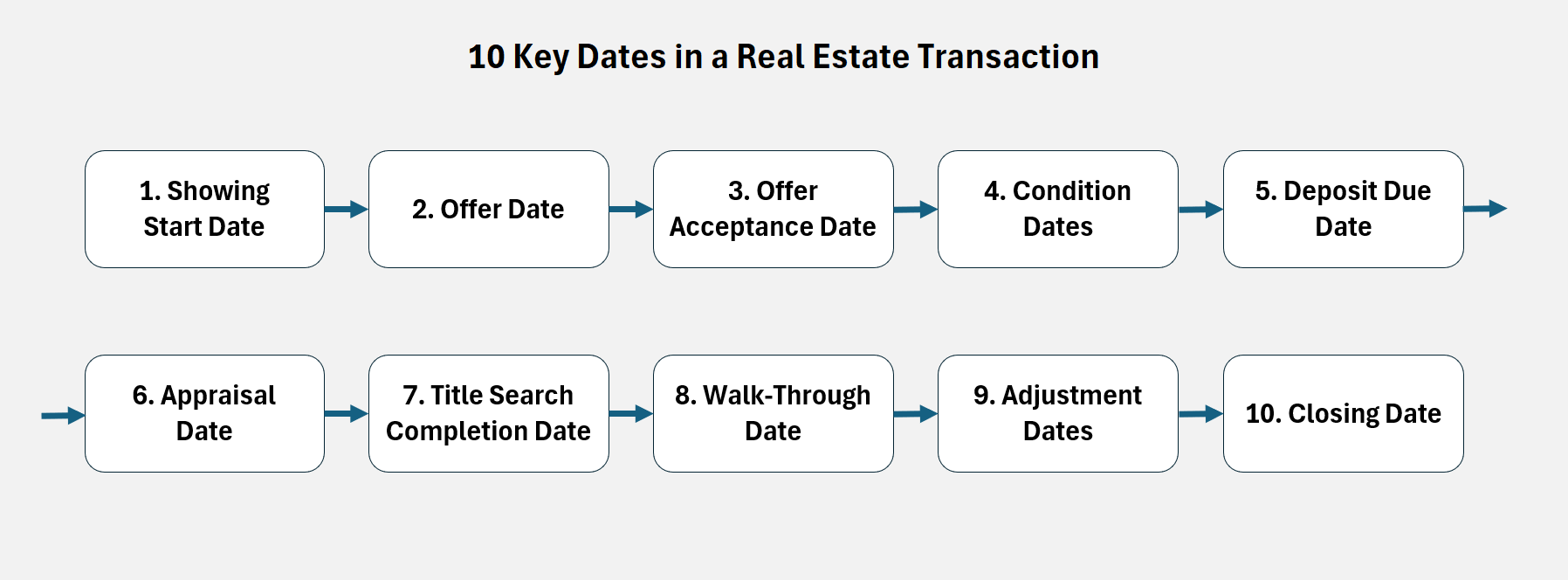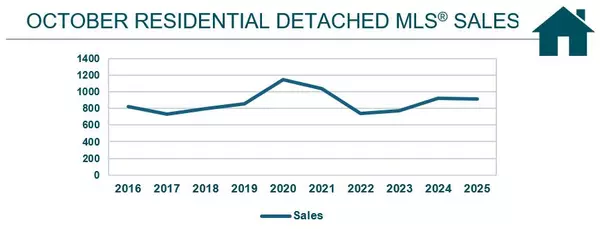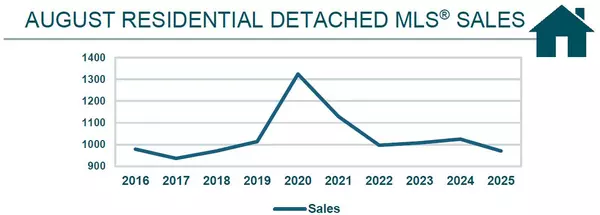10 Key Dates in a Real Estate Transaction
What Every Buyer and Seller Should Know about the Real Estate Timeline
When you’re buying or selling a home, timing is everything. From the first day a property hits the market to the moment keys are handed over, several milestones keep the transaction on track. Each date serves a unique purpose—helping protect both buyer and seller, ensuring legal compliance, and avoiding costly delays.
Most people are familiar with a few big ones like the offer date or closing day, but there are actually 10 key dates that shape the entire process. Knowing each one will give you confidence, help you plan, and make the journey from “for sale” to “sold” as smooth as possible.
When you’re buying or selling a home, you’ll come across several important dates. Each one plays a unique role in the process.

10 Dates That are Relevant to a Real Estate Deal
1. Showing Start Date
The first day that buyers can officially view the property.
-
Common when sellers set a marketing plan to generate interest before allowing showings.
-
Helps build momentum and ensures all buyers have a fair chance to see the home.
2. Offer Date
The date when the seller will begin reviewing offers.
-
Often used in competitive markets to encourage multiple offers.
-
Buyers can prepare in advance, get pre-approvals in place, and submit their best terms by that day.
3. Offer Acceptance Date (Purchase Date)
The day the buyer and seller agree on the terms and both sign the Offer to Purchase Agreement (OTP).
-
This is when the deal becomes firm, provided all conditions are met (financing, home inspection, etc.).
4. Condition Dates
Dates tied to specific conditions in the offer, such as financing approval, home inspection, or condo document review (end of 7 Day Cooling Off Period).
-
Each condition has a deadline when the buyer must either remove the condition or walk away from the deal.
5. Deposit Due Date
The date the buyer must provide the agreed-upon deposit to the seller’s brokerage.
-
Shows the buyer’s commitment and secures the transaction.
-
Missing this date can put the buyer in breach of contract.
-
Typically required within 24–48 hours after offer acceptance.
6. Appraisal Date
The scheduled day when the lender’s appraiser visits the property or determines the homes Market Value
-
Ensures the home’s market value matches or exceeds the purchase price.
-
Important for mortgage approval and final financing terms.
-
Delays can affect the financing condition timeline.
7. Title Search Completion Date
The date by which the buyer’s lawyer completes the title search.
-
Verifies legal ownership and checks for liens or encumbrances.
-
Protects the buyer from unexpected legal or financial issues.
-
Often occurs well before closing to allow time to resolve problems.
8. Walk-Through Date
The final visit the buyer makes to the property before closing.
-
Ensures the home is in the same condition as agreed in the contract.
-
Gives the buyer peace of mind before taking possession.
-
Usually scheduled a day or two before closing.
9. Adjustment Date
The date when property-related expenses are balanced between buyer and seller.
-
Covers items such as property taxes, utilities, or condo fees.
-
Ensures fair cost-sharing up to the exact day of possession.
-
Handled by lawyers or closing agents during final settlement.
10. Closing Date (Possession Date)
-
The day legal ownership transfers from seller to buyer.
-
The buyer pays the balance owing, receives the keys, and officially takes possession of the home.
Why These Dates Matter
Each of these dates plays a critical role in guiding a real estate transaction from start to finish. Missing one could mean losing the deal, facing penalties, or experiencing costly delays in moving.
By staying on top of the timeline, both buyers and sellers can protect themselves and make the process as smooth as possible.
Tara Zacharias, REALTOR®
Categories
Recent Posts










Leave a Reply
 REALTOR®
REALTOR®I became a REALTOR® because I truly enjoy helping people find the place that feels like home and because providing exceptional service during such an important moment in someone’s life is something I genuinely care about. Supporting sellers as they move on, move up, or move forward is just as meaningful, and being part of that transition is something I’m grateful to contribute to.
I make the buying or selling journey feel organized and approachable with clear communication and practical guidance. With an approach supported by market data, trends, and neighbourhood insights, you'll always understand what’s happening and how to make the most informed decisions.
Whether you’re buying your first home, selling a place filled with memories, or planning your next step, I’m here as someone who listens, shows up, and puts your goals at the centre of every decision. I'm focused on what serves you best.
I'm Tara Zacharias, a real estate salesperson located in the vibrant city of Winnipeg. Thanks for stopping by and taking the time to get to know me!+1(204) 293-0933 tara@tarazacharias.com330 St Mary Ave, Winnipeg, MB, R3C 3Z5, CAN
https://tarazacharias.com/

